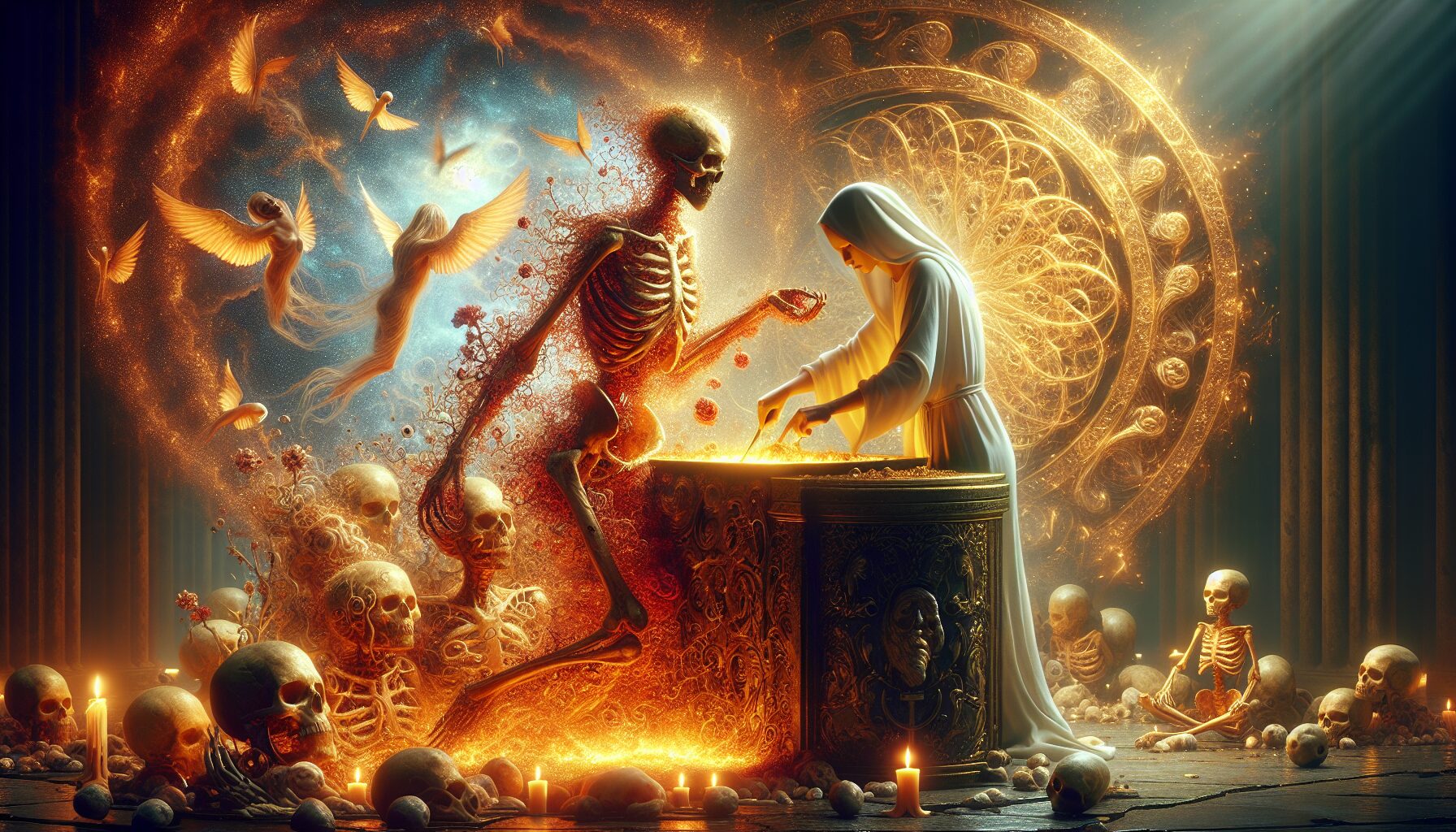The Alchemy of Death – Turning Flesh Into Wisdom
The concept of death is often cloaked in mystery and fear, yet across cultures and histories, it has been perceived as much more than just an end. Rather, it has served as a transformative process—the ultimate alchemical conversion where flesh gives way to wisdom. This transcendental view sees death not as an obliteration of existence, but as a synthesis of corporeal experience into a higher form of understanding.
The Alchemical Philosophy
Alchemy, historically, was not just about the literal transformation of base metals into gold. Its practitioners sought spiritual elevation and enlightenment, using physical symbols and processes as metaphors for deeper truths. As Carl Jung described, alchemy is also about “the transmutation of the personality” (Simply Psychology).
“Alchemy is the art of far and near, and I think poetry must be the same. How shall its mysteries be deciphered?” — Hart Crane
Death, in this context, is viewed as a necessary metamorphosis. Just as alchemy turns base metals into pure gold, death is believed to convert the mundane experiences of a person into a purified essence—knowledge and wisdom that transcend the individual self.
Death in Ancient Cultures
Many ancient cultures revered death as a sacred transition rather than an unfortunate cessation. The Egyptians believed in the rebirth after death, where the soul would journey through the afterlife to gain eternal wisdom. Their intricate burial practices were designed to prepare the soul for this arduous but enlightening journey.
Similarly, in the Tibetan Book of the Dead, death is seen as a critical time for gaining insight. The text offers guidance for the soul as it navigates through the bardo—a transitional state where it has the opportunity to achieve enlightenment before rebirth.
- The Egyptian “Book of the Dead” contains spells and incantations to aid the deceased on their post-mortem journey.
- The Mayan view of the afterlife included Xibalba, a place to overcome trials to attain serenity and wisdom.
- In Hinduism, the cycle of death and rebirth (samsara) is aimed at self-realization and moksha, liberation and ultimate wisdom.
Modern Interpretations
In modern times, thinkers and spiritual leaders have continued to explore the idea of death as a transformative process. Philosopher and psychoanalyst Jacques Lacan suggested that accepting the inevitability of death is a key part of the human symbolism and self-realization process. Facing our mortality, we begin to alter our understanding not only of ourselves but also of the knowledge we carry.
“Death is nature’s way of telling you to slow down.” — Dick Sharp
Personal Transformation through Mortality
Often, the confrontation with death, whether through personal loss or near-death experiences, catalyzes a profound change in perspective. People report significant shifts in their priorities, values, and the understanding of their place in the universe.
- The near-death experience (NDE) often heightens spiritual awareness and leads to a reevaluation of life’s purpose.
- Grief can open the path to self-discovery and greater emotional intelligence.
A study by Dr. Raymond Moody, known for his works on the concept of life after death, highlights recurring themes of light, peace, and universal love experienced during NDEs. These elements contribute to a deeper understanding and wisdom in those who return.
The Philosophical Implications
From a philosophical standpoint, accepting death as a transformative stage rather than an end challenges the traditional linear view of life and death. It aligns more closely with cyclic philosophies seen in some Eastern traditions, which suggest that enlightenment—a pure form of wisdom—lies beyond the cessation of physical life.
Furthermore, as Alan Watts puts it, “Trying to define yourself is like trying to bite your own teeth.” In essence, the wisdom that comes post-mortem might finally allow one to see beyond individual identity towards a universal connectivity that is elusive in life.
Conclusion
Ultimately, death as a process of alchemical transformation offers a narrative where the cessation of life is but a doorway to wisdom. This paradigm invites us to look beyond the fear and understand death as an integral part of life’s journey—one that promises a conversion from mere flesh to profound wisdom.
Recognizing death as a continuing process of growth and understanding can bring peace and courage in life, encouraging us to live fully with the acceptance that the culmination of our experiences might transform into the ultimate alchemy: wisdom eternal.
